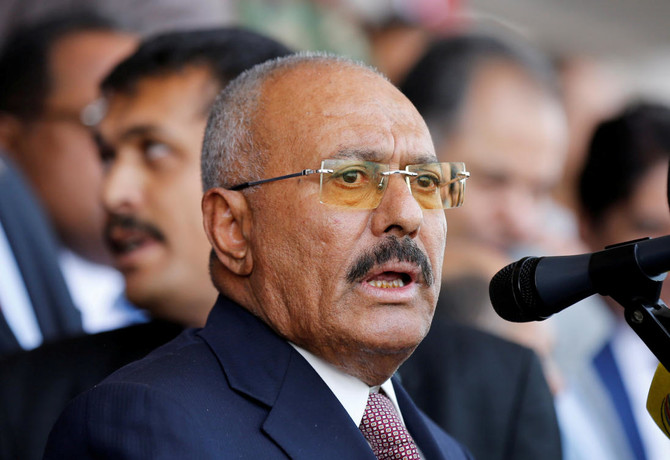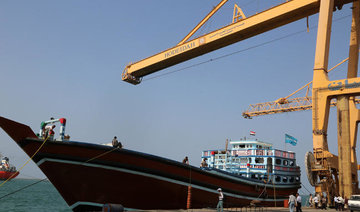ADEN: Former Yemeni President Ali Abdullah Saleh on Saturday said he is ready for a “new page” in relations with the Saudi-led Arab coalition supporting the country’s internationally recognized government.
His outreach to the coalition came as his supporters battled Iran-backed Houthi fighters for a fourth day in the capital Sanaa, as the two sides traded blame for a rift between them that could affect the course of the civil war.
The fighting began on Wednesday when Saleh’s General People’s Congress (GPC) party accused the Houthis of breaking into the city’s main mosque complex and firing rocket-propelled grenades. Both sides reported at least 16 people killed in the fighting since Wednesday.
“I call upon the brothers in neighboring states and the (Arab) alliance to stop their aggression, lift the siege, open the airports and allow food aid and the saving of the wounded, and we’ll turn a new page by virtue of our neighborliness,” Saleh said in a televised speech. “What happened to Yemen is enough.”
In 2012, he stepped down after 33 years in office following months of protests against his rule, but remained leader of the GPC, Yemen’s largest political party.
The Arab coalition praised Saleh for “taking the lead” after he said he and the GPC are open to talks with it.
This decision “will free Yemen of... militias loyal to Iran,” the coalition said, adding that it is closely monitoring fighting between the Houthis and pro-Saleh forces.
The differences between the rebel factions are due to the Houthis’ attempts to impose, by force of arms, their will on the Yemeni people, the coalition said.
It called on Yemenis, including GPC supporters, to unite against the Houthis for the benefit of the entire country.
The coalition reiterated its full support for attempts by the Yemeni people to preserve their land, identity, integrity and social unity within the framework of Arab, regional and international security.
Meanwhile, Yemen’s legitimate government led by President Abed Rabbo Mansour Hadi expressed grave concern over the repetition of criminal Houthi practices such as raiding government institutions, places of worship, courts and private properties, laying siege to political leaders and intimidating and humiliating citizens.
Hadi’s meeting with top advisers and aides called for opening a new page with political parties on the basis of the three agreed terms which enjoy national, regional and international support in order to form a national alliance to defeat the Houthis.
The meeting exhorted all Yemenis in Sanaa and other cities to develop Saturday’s move into a popular national uprising against the Houthis.
It said in a statement that parties involved in the war in the past three years who have decided to support the uprising will be under the umbrella of the government. It called upon the GPC and civil society groups to unite “in order to end the Houthi nightmare.”
Hadi’s vice president called for national unity to challenge the Houthis’ control over the country’s institutions and their crimes against the Yemeni people.
Lt. Gen. Ali Mohsen Saleh praised the Yemeni people’s growing awareness of the national, regional and international dangers posed by the Houthis.
Sanaa residents described heavy fighting early Saturday on the streets of Hadda, a southern residential district of the Yemeni capital, where many of Saleh’s relatives live.
The fighting subsided by the afternoon as Saleh supporters secured control. There was no immediate word on casualties.
Rajesh Badi, spokesman for Yemen’s government, said: “What’s happening in Sanaa is an uprising against injustice and against the bloody Houthi coup, which has been destroying the country’s assets for the past three years.”
“We call on all Yemenis to rise against the Houthi militias, who sought to implement the Iranian agenda in Yemen,” he added.
“Sanaa and the Yemeni people are sending a message to Iran and its puppet Houthis that Yemen... will always remain an Arab state,” Badi said.
“Yemen refuses to be a tool of the Iranians. It gives a strong message to the Houthis: They have no place in Yemen.”
The legitimate government said it has been maintaining an open channel of communication with several GPC leaders.
The party said in a statement on its website that the Houthis bear responsibility for dragging Yemen into the civil war.
The conflict has killed more than 10,000 people since 2015, displaced more than 2 million, caused a cholera outbreak infecting nearly 1 million people, and left Yemen on the brink of famine.
Saleh ready for ‘new page’ with Saudi-led coalition
Saleh ready for ‘new page’ with Saudi-led coalition

Arab coalition warns against military moves undermining de-escalation in Yemen

DUBAI: The Arab coalition supporting Yemen’s internationally recognised government warned on Saturday that any military movements undermining de-escalation efforts would be dealt with immediately to protect civilians, according to the Saudi Press Agency.
The coalition’s spokesperson, Major General Turki Al-Maliki, said the warning follows a request from Yemen’s Presidential Leadership Council to take urgent measures to protect civilians in Hadramout Governorate amid what he described as serious humanitarian violations by groups affiliated with the Southern Transitional Council.
The statement said the measures are part of ongoing joint Saudi-Emirati efforts to reduce tensions, facilitate the withdrawal of forces, hand over military camps, and enable local authorities to carry out their duties.
Al-Maliki reaffirmed the coalition’s support for Yemen’s internationally recognized government and called on all parties to exercise restraint and engage in peaceful solutions, the agency reported.
The STC has pushed the internationally recognised government from its headquarters in Aden while claiming broad control across the south this month.
Saudi Arabia has called STC forces to withdraw from areas it seized earlier in December in the eastern provinces of Hadramout and Mahra.














